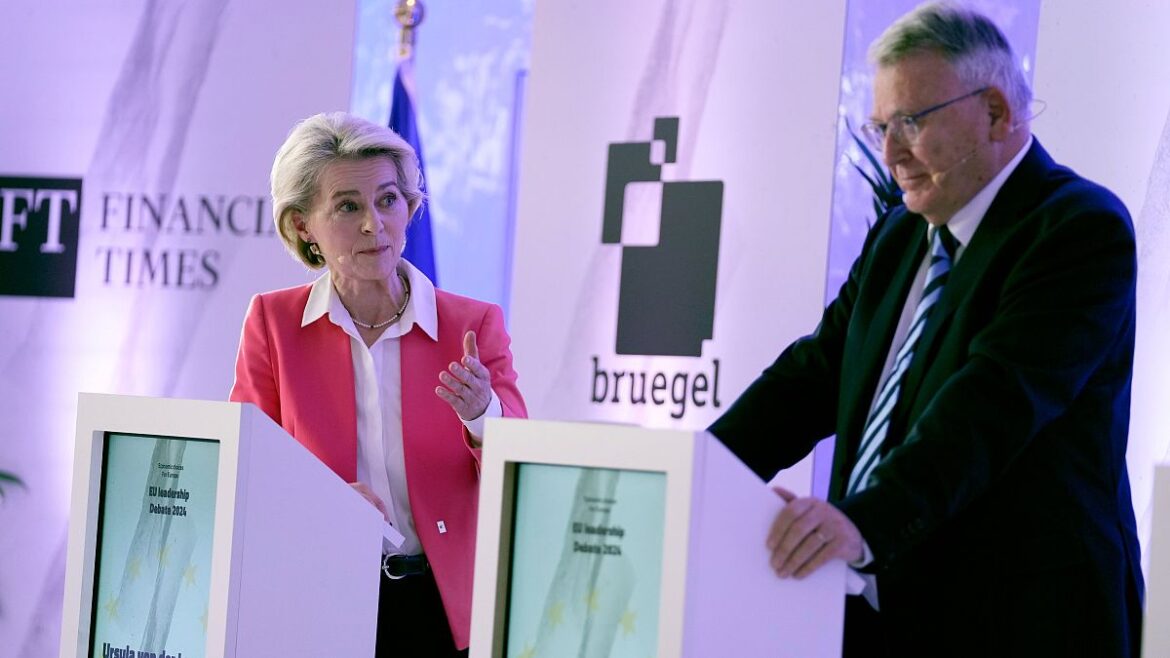Almost two weeks before the European elections, the candidates have displayed their differences on the scale of Union spending, which amounts to several billion euros, on European air defense and on trade relations with China.
Four heads of list in the European elections met for a debate on Tuesday, devoted to the economy. The size of the European budget and the use of this budget revealed the fault lines between the participants.
Candidate for a second term at the head of the European Commission, Ursula von der Leyen (PPE) spoke of the financing of a new European air defense system.
“I would advocate for example for an air defense shield as a common European project“, explains the one who was Minister of Defense in Germany. If this initiative were to come true, it could require significant funding.
But behind the proposals, the budgetary question indicates disagreements over how to adjust the EU’s finances.
“We don’t reduce the budget, we increase it“, says liberal Sandro Gozi. He says new sources of EU revenue, such as a tax on food waste, could help finance challenges like climate change and security.”You can’t navigate the future by looking in the rearview mirror.“.
EU spending amounted to nearly 250 billion euros in 2022. However, since the pandemic, member states have spent a lot of money to support economic activity. In this context, the next seven-year financial framework of the EU will be one of the most difficult tasks of the future Commission.
Sandro Gozi’s approach was widely supported by the social democratic candidate Nicolas Schmit, currently European Commissioner in charge of Employment. He says the current budget is “notnot huge“and that the strengthening of defense following Russian aggression in Ukraine”will not be possible without a certain indebtedness of Europe“.
Ursula von der Leyen was less precise about her intentions. She suggests she may be willing to cut farm subsidies and aid to poorer regions, to prioritize new areas of spending.
“Agriculture and cohesion will undoubtedly play a role, but we must focus on what is most important at the moment“, assures the head of the Christian Democratic list.
Far-right representative Anders Vistisen has pledged to cut 6,000 positions within the institutions and halve EU agencies. But he did not specify the exact savings he planned to achieve with these cuts.
Trade war?
The candidates also clashed over how to deal with Beijing’s aggressive trade practices. Ursula von der Leyen is hinting she would move away from the United States, which last week imposed steep tariff increases on Chinese goods including chips, solar panels and electric vehicles.
“We share some of the concerns of our (American) counterparts, but we have a different approach, a much more tailored approach“, insists the German official. She recalls that the EU has undertaken a several-month investigation to determine whether China’s commercial practices comply with global standards.
“If my suspicion is confirmed that such (Chinese) subsidies exist, I can guarantee that the level of customs duties we impose will correspond to the level of damage“, she explains.
With fewer candidates on the podium, the atmosphere was less tense than during last month’s debate in Maastricht, during which Ursula von der Leyen also debated with Nicolas Schmit and Anders Vistisen on Ukraine and the situation in Gaza.
Renew Europe seems to have decided to change its face for these meetings. After a performance in April considered disappointing for Marie-Agnes Strack-Zimmerman, the centrist group is putting forward the Italian Sandro Gozi, candidate on President Emmanuel Macron’s French list.
If Nicolas Schmit repeatedly invoked Jacques Delors, the French socialist who headed the Commission from 1985 to 1994, Sandro Gozi insisted on the record of his adversaries.
The lack of progress on reforming EU capital markets is “the biggest failure of the EPP“, assures the Italian.
If Anders Vistisen explains that he wanted to force the Chinese social network TikTok to be sold or banned, Sandro Gozi accuses him of opposing the EU legislation on digital services (Digital Services Act – DSA), intended to control large online platforms.
Europeans go to the polls from June 6 to 9 to elect the 720 deputies who will sit in the European Parliament for five years.
According to current polls, Ursula von der Leyen’s European People’s Party should remain the leading force, which should favor its renewal.
However, the EPP will likely need to find coalition partners to form a majority. But before that, Ursula von der Leyen must be proposed as a candidate by the 27 heads of state and government.



